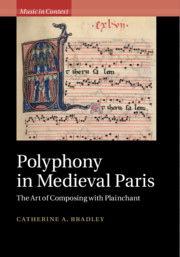
-
Select format
-
- Publisher:
- Cambridge University Press
- Publication date:
- July 2018
- August 2018
- ISBN:
- 9781108290456
- 9781108418584
- 9781108407571
- Dimensions:
- (247 x 174 mm)
- Weight & Pages:
- 0.77kg, 298 Pages
- Dimensions:
- (244 x 170 mm)
- Weight & Pages:
- 0.541kg, 299 Pages
- Series:
- Music in Context
- Subjects:
- Medieval and Renaissance Music, Music, Music Criticism
You may already have access via personal or institutional login- Series:
- Music in Context
- Subjects:
- Medieval and Renaissance Music, Music, Music Criticism
Book description
Polyphony associated with the Parisian cathedral of Notre Dame marks a historical turning point in medieval music. Yet a lack of analytical or theoretical systems has discouraged close study of twelfth- and thirteenth-century musical objects, despite the fact that such creations represent the beginnings of musical composition as we know it. Is musical analysis possible for such medieval repertoires? Catherine A. Bradley demonstrates that it is, presenting new methodologies to illuminate processes of musical and poetic creation, from monophonic plainchant and vernacular French songs, to polyphonic organa, clausulae, and motets in both Latin and French. This book engages with questions of text-music relationships, liturgy, and the development of notational technologies, exploring concepts of authorship and originality as well as practices of quotation and musical reworking.
Awards
Winner, 2019 Early Music Award, American Musicological Society
Reviews
'Catherine A. Bradley’s superb new book takes us back to the world of medieval Paris where musicians and poets were experimenting with the ways in which plainsong, polyphony, rithmus and the conventions of liturgical and paraliturgical celebration could be combined, differentiated and subverted. She does this by returning to the venerable question of the birth of the motet, and cognate genres. On the way, she brilliantly reminds us of the importance of the female voice in some unlikely places and, in a virtuosic side glance at the relationship between organum and clausula, comes close to uncovering an entirely new subgenre. Magisterial in every regard.'
Mark Everist - University of Southampton
'Polyphony in Medieval Paris brings a much-needed analytical perspective to thirteenth-century polyphony. With exceptional acumen, Bradley challenges prevailing narratives about how this repertory emerged and offers fresh insights into the priorities and choices of its composers. Through the new analytical approaches she develops, she also deepens our understanding of issues as diverse as intertextuality and gender.'
Rebecca Maloy - University of Colorado, Boulder
‘Bradley’s book unsettles received views of the thirteenth-century motet and impresses by its powerful combined methodology of incisive musical analysis, and consideration of the material and notational trace. She animates the skilled and serious playfulness of nameless medieval composer-singers, authoritatively exemplifying the broad range of precise and technically advanced skills necessary to engage these fascinating and compositionally complex pieces of music … Of particular note is Bradley’s combination of detailed philological inquiry with creative musical imagination. Her hermeneutic lens challenges traditional understandings of the evolution of the motet genre, finding a surprising degree of bi-directional fluidity. This reframing has significant value for broader considerations of compositional process, musical borrowing, and intertextuality in and beyond medieval Paris.'
Source: Official citation for 2019 Early Music Prize, American Musicological Society Awards Committee
'… this remarkable study … constitutes an undeniably important contribution to the revival of musicological thought on the motet of Ars Antiqua … the reader will be rewarded by the beautiful immersion it offers in the workshop polyphonic writing of the thirteenth century, and the spectacle offered by the richness and virtuosity of its composition processes.'
Gaël Saint-Cricq Source: translated from Revue de musicology
Contents
Metrics
Altmetric attention score
Full text views
Full text views help Loading metrics...
Loading metrics...
* Views captured on Cambridge Core between #date#. This data will be updated every 24 hours.
Usage data cannot currently be displayed.
Accessibility standard: Unknown
Why this information is here
This section outlines the accessibility features of this content - including support for screen readers, full keyboard navigation and high-contrast display options. This may not be relevant for you.
Accessibility Information
Accessibility compliance for the PDF of this book is currently unknown and may be updated in the future.


